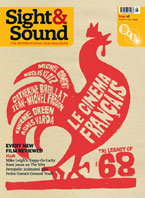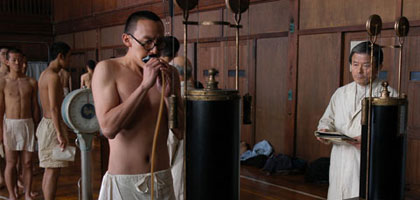Primary navigation

People's Republic of China/Hong Kong 2006

Reviewed by Roger Clarke
Our synopses give away the plot in full, including surprise twists.
The film opens with 2004 footage of Chinese Go master Wu Qingyuan. We then turn to his childhood, and see him growing up in the grand family mansion in China. Quotes from Wu's own writings tell how he learned the ancient chess-like game of Go at the age of seven from his father.
At a professional Go match in Japan in 1933, Wu suffers the first of many personal crises when he is asked by his Japanese mentors and hosts to assume Japanese citizenship. He joins a religious cult and succumbs to tuberculosis. Exempted from national service in the Japanese army, he begins to reject Go and spends more time with his sect, now rapidly transforming into a personality cult around a woman named Jiko. Towards the end of WW2 he declines a move to Hiroshima to play a championship match, and so escapes the US atomic attack. Though instructed by Jiko to return to Go, he leaves the cult in 1948 and for 17 years remains undefeated world champion.
Eschewing the traditional structure of the 'chess movie', usually reduced to a crass sporting formulation by Hollywood - genius training, setback, victory - here is a film that never explains the rules of its obscure game (the ancient Chinese board game Go), never shows a match to its conclusion and never reveals who wins anything. Based on the life of Chinese Go master Wu Qingyuan, this is instead a graceful, exquisite film about the complex relationship between China and Japan; it is also a film about one man's spiritual quest and his intensely personal love-hate relationship with the board game at which he so obviously excels. Taiwanese actor Chang Chen (Crouching Tiger, Hidden Dragon, Happy Together) plays the man himself, appearing in almost every scene, in one of the great and unheralded central performances of recent years.
It's hard not to read a certain amount of autobiographical content into director Tian Zhuangzhuang's story; after completing The Blue Kite (1993) he withdrew from directorial duties after quarrels with the Chinese Film Board. Tian's absence for nearly ten years before his comeback with the slightly soporific Springtime in a Small Town (2002) perhaps mirrors Wu's exile from the practice of Go in The Go Master - a practice which, when he is in the zone, devolves into a kind of exalted syncope as he screens out all distractions (in one striking scene not even noticing that his opponent has keeled over with exhaustion).
But this is Go - obsessional, and with a code akin to samurai; it's everywhere in the film. During WW2, with Wu now a Japanese citizen and hugely conflicted, the national contest is moved out of Tokyo to Hiroshima (Wu declines to participate). After the atomic bomb goes off, the opponents simply dust themselves down and get on with finishing the game. Not even 60kg of enriched uranium can stop the tournament.
Tian correctly realises that exposition is a pitfall in a film such as this; consequently we learn almost nothing about the ideals of the religious cult Wu joins at an early stage, nor much about the game of Go. Instead Tian cuts to the chase with a number of expertly chosen, characteristically gnomic statements taken from Wu's own writings, displayed across the screen.
It is interesting to discover, knowing Tian's interest in father-son relationships, that according to legend Go was invented by order of a Chinese king 4,000 years ago to teach his son discipline. This isn't mentioned in the film - but we do get a sequence of Japanese father-figures cultivating and encouraging Wu in his craft. With Japan and China, who is the father and who is the son? Did not the Japanese perfect the game, after all?
As far as Wu's onscreen character goes, we've seen this tubercular introvert in Springtime in a Small Town. We've seen political and personal crises in The Blue Kite. But in many ways this is a departure for the fifth-generation director; the comparison that springs to mind, considering his customary interest in ordinary lives, is perhaps akin to Mike Leigh suddenly breaking out of his usual mould and making Topsy-Turvy.
The costumes by Oscar-winning Emi Wada (Ran) are ravishing and the historic scenes exquisitely framed and modulated. Everything, it almost goes without saying, is very Zen. The scenes are all short and perfectly poised; the texture of everything is to the fore; the polish of the Go counters, the spaces they occupy, the use of margins, play and counterplay, intuition and intellect all perfectly in unison. Tian, it strikes you after a while, is making the film exactly as if he's playing Go, one move after another, marshalling clusters of experience, one object forcing out another in a rigid framework. It's an ingenious way to suffuse the film with the elusive texture of this ancient and fascinating game, at times approaching the level of a Buddhist incantation or a Japanese tea ceremony.